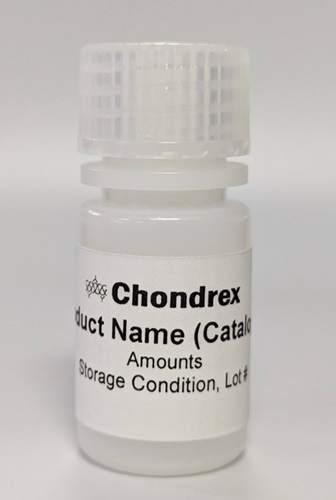Minor contaminants in collagen preparations, such as pepsin and proteoglycans, are highly immunogenic, and may stimulate undesired T-cells with in vitro and in vivo experiments. Furthermore, antigen presentation cells cannot process native collagen in an in vitro culture system, since these cells generally lack collagenolytic enzymes. In addition, collagen forms a gel at 37°C during cell culture, which is fatal to these cells. Therefore, it is critical to use heat-denatured collagen instead of native collagen for in vitro T-cell stimulation. Chondrex, Inc. provides ultra-pure, pepsin-free, denatured collagen for T-cell proliferation assays, establishing T-cell lines, or for assaying cytokines released by activated T-cells.
In order to accommodate the variety of collagen studies available, Chondrex, Inc. offers different grades of collagen such as immunization grade, cell culture grade, ELISA grade, T-cell assay grade, and collagen CB fragments. If you need help deciding which grade of collagen is right for your study, please see our Understanding Chondrex, Inc.'s Grades of Purified Collagen article or contact us. For more information distinguishing between Type I and Type II collagen, please see our Type I & Type II Collagen: Structure Influences Staining Patterns article or contact us.
Collagen Solubilizing Buffer
T-Cell Grade Type I Collagen
|
Species |
Quantity |
Catalog # |
Price (USD) |
 |
Bovine |
0.5 mg, lyophilized |
1052 |
110.00 |
 |
Chick |
0.5 mg, lyophilized |
1051 |
110.00 |
 |
Human |
0.5 mg, lyophilized |
1055 |
333.00 |
 |
Mouse |
0.5 mg, lyophilized |
1056 |
142.00 |
 |
Porcine |
0.5 mg, lyophilized |
1053 |
110.00 |
 |
Rat |
0.5 mg, lyophilized |
1054 |
142.00 |
T-Cell Grade Type II Collagen
|
Species |
Quantity |
Catalog # |
Price (USD) |
 |
Bovine |
0.5 mg, lyophilized |
2022 |
215.00 |
 |
Chick |
0.5 mg, lyophilized |
2021 |
215.00 |
 |
Human |
0.5 mg, lyophilized |
2025 |
417.00 |
 |
Monkey |
0.5 mg, lyophilized |
2027 |
269.00 |
 |
Mouse |
0.5 mg, lyophilized |
2026 |
582.00 |
 |
Porcine |
0.5 mg, lyophilized |
2023 |
215.00 |
 |
Rat |
0.5 mg, lyophilized |
2024 |
269.00 |
Protocol for in vitro T-cell proliferation assay













